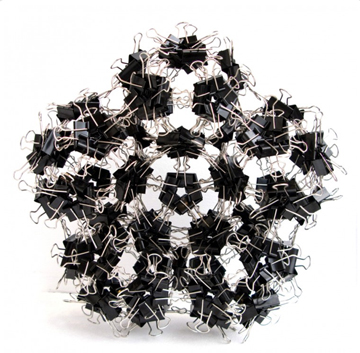Is Occupy Art?
 Sunday, June 3, 2012 at 10:56AM
Sunday, June 3, 2012 at 10:56AM 
Carl Scrase, "Fractal 090812," bull-clips, 2009. Courtesy John Buckley Gallery.
[An interview by WE Magazine with Carl Scrase]
[EXCERPT]:
WE_MAGAZINE
I assume Carl, you’d argue #occupy is art. Why?CARL SCRASE: To be honest, I’m not sure if ‘argue’ is the correct verb. I may ‘propose’, ‘put forward’ or ‘ponder whether’. But no, no, I would not fervently argue such potentially slippery logic.
If I were to be pressured into giving an answer – which I suppose I am by virtue of being interviewed – I would offer the following.
I would suggest that in attempting to link ‘occupy’ and ‘art’ one could begin with a paper written in 2008 by Malcolm Miles, entitled Society As a Work of Art and then go on to watch the You Tube clip of him giving a lecture on the same theme. Malcolm gives a fantastic overview of the writing of Herbert Marcuse, talks about Joseph Beuys and touches on the topics of utopia, revolution, the history of occupations and how they all relate to art. This is a really interesting and informative summation of the historical underpinnings of ‘art’ and revolutionary social movements.
In the question and answer session at the end of the lecture Malcolm talks about Joseph Beuys’ claim that “Everyone is an artist”. To paraphrase Malcolm’s take on this famous phrase: Joseph Beuys means by this that everyone has a creative imagination and can envisage new social as well as artistic forms. The definition of art dissolves here into free living.
Joseph Beuys called himself a ‘social sculpture’, expanding and adding to the ambitions of the artist. This following quote from Beuys sums up his stance, and I believe is very interesting when linking ‘art’ + ‘occupy’. His words seem very prescient now, considering they were spoken in 1987, some 25 years ago: “In the future all truly political intentions will have to be artistic ones. … they will have to stem from human creativity and individual liberty. … this cultural sector … would be a free press, free TV, and so on … free from all state intervention. I am trying to develop a revolutionary model that formulates the basic democratic order in accordance with the people’s wishes … that changes the basic democratic order and then restructures the economic sector in a way that will serve the people’s needs and not the needs of a minority that wants to make its profits. That is the connection, and this I define as Art.”
 admin |
admin |  Post a Comment |
Post a Comment |  CARL SCRASE,
CARL SCRASE,  IS OCCUPY ART? in
IS OCCUPY ART? in  interviews
interviews
Reader Comments